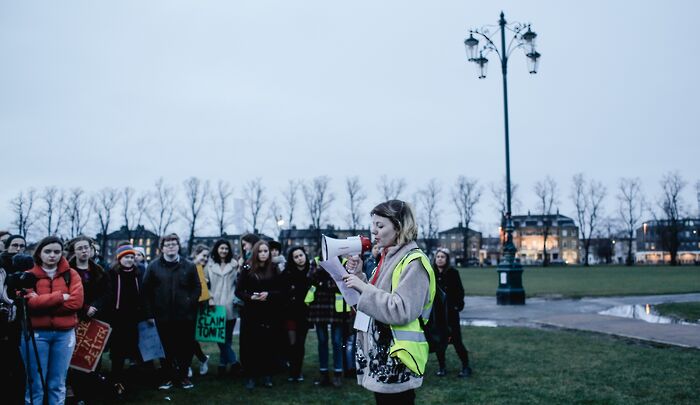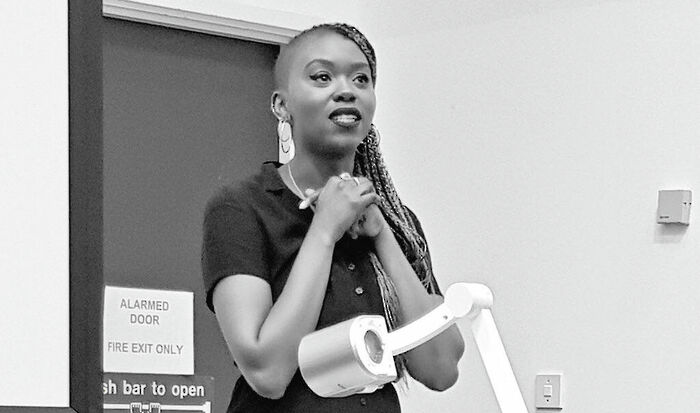Cambridge's Disciplinary Procedure
Standard of proof ‘beyond reasonable doubt’ debated in Senate House
Students and staff spoke on the motion to reform the disciplinary procedure in an open discussion, with Vice-chancellor Stephen Toope in attendance

Proposed reforms to the University’s disciplinary procedure were debated at length in Senate House today, as speakers framed the issue around implications for victims of sexual assault.
The discussion follows the recent open letter published by the CUSU Women’s campaign (WomCam), which included over 800 signatures in support of changing the disciplinary procedure.
Shortly before the discussion, students tied hundreds of ribbons to the gates of Senate House to pay tribute to survivors of sexual assault and domestic violence.
The discussion was triggered by WomCam, who encouraged ten academics to write to University Draftsman Ceri Benton in support of holding the meeting. Benton is responsible for ensuring the enactment of changes to the University’s statutes and ordinances.
More than 20 staff and students spoke on the issue. CUSU women’s officer Lola Olufemi opened the speeches by emphasising that the University’s Breaking the Silence campaign needed to be transformed into a “meaningful procedure”.
Micha Frazer-Carroll, CUSU welfare and rights officer, said that the current system is “retraumatizing”. She pointed out that “fewer than ten students” use the current disciplinary procedure each year, arguing that this is due to the system “playing into a culture of disbelieving survivors.”
Arguments in favour of reforming the disciplinary procedure generally focused on the University being unqualified to act as a court of law and the fact that currently a high proportion of sexual assault cases go unreported, or without conviction. CUSU President Daisy Eyre argued that “the disciplinary procedure should bring justice, not further trauma”. Ruby Kwong, Newnham JCR women’s officer, added that “all students deserve to feel safe and supported during their studies”.
Five individuals spoke against the proposed reforms. Downing college student Andreas Bedorf argued that the current system meant that “you have the right to make a case but you don’t have the right to be believed as soon as you walk through the door”. Clare college student Hugh Wright added that he saw it as “common sense” to punish someone only if there is proof beyond reasonable doubt that they committed the crime.
At an open meeting earlier this month, the University’s Vice-chancellor Stephen Toope said that he “personally” supports the reforms, though he advised that he is “only a voice in the consultation process”.
The discussion ended with no comment from Toope. A spokesperson for the University of Cambridge told Varsity that the current consultation period will “enable the Review Committee on Discipline to reach the best decision for the University, which would ultimately be subject to further University consultation”. They added, “we cannot pre-judge what that decision will be.”
The University of Cambridge Health and Welfare Committee will discuss proposed revisions to its handling of student cases involving sexual misconduct on Monday 7th May.
 Comment / Cambridge’s tourism risks commodifying students18 April 2025
Comment / Cambridge’s tourism risks commodifying students18 April 2025 News / Cambridge student numbers fall amid nationwide decline14 April 2025
News / Cambridge student numbers fall amid nationwide decline14 April 2025 News / Greenwich House occupiers miss deadline to respond to University legal action15 April 2025
News / Greenwich House occupiers miss deadline to respond to University legal action15 April 2025 Comment / The Cambridge workload prioritises quantity over quality 16 April 2025
Comment / The Cambridge workload prioritises quantity over quality 16 April 2025 News / Varsity ChatGPT survey17 April 2025
News / Varsity ChatGPT survey17 April 2025






